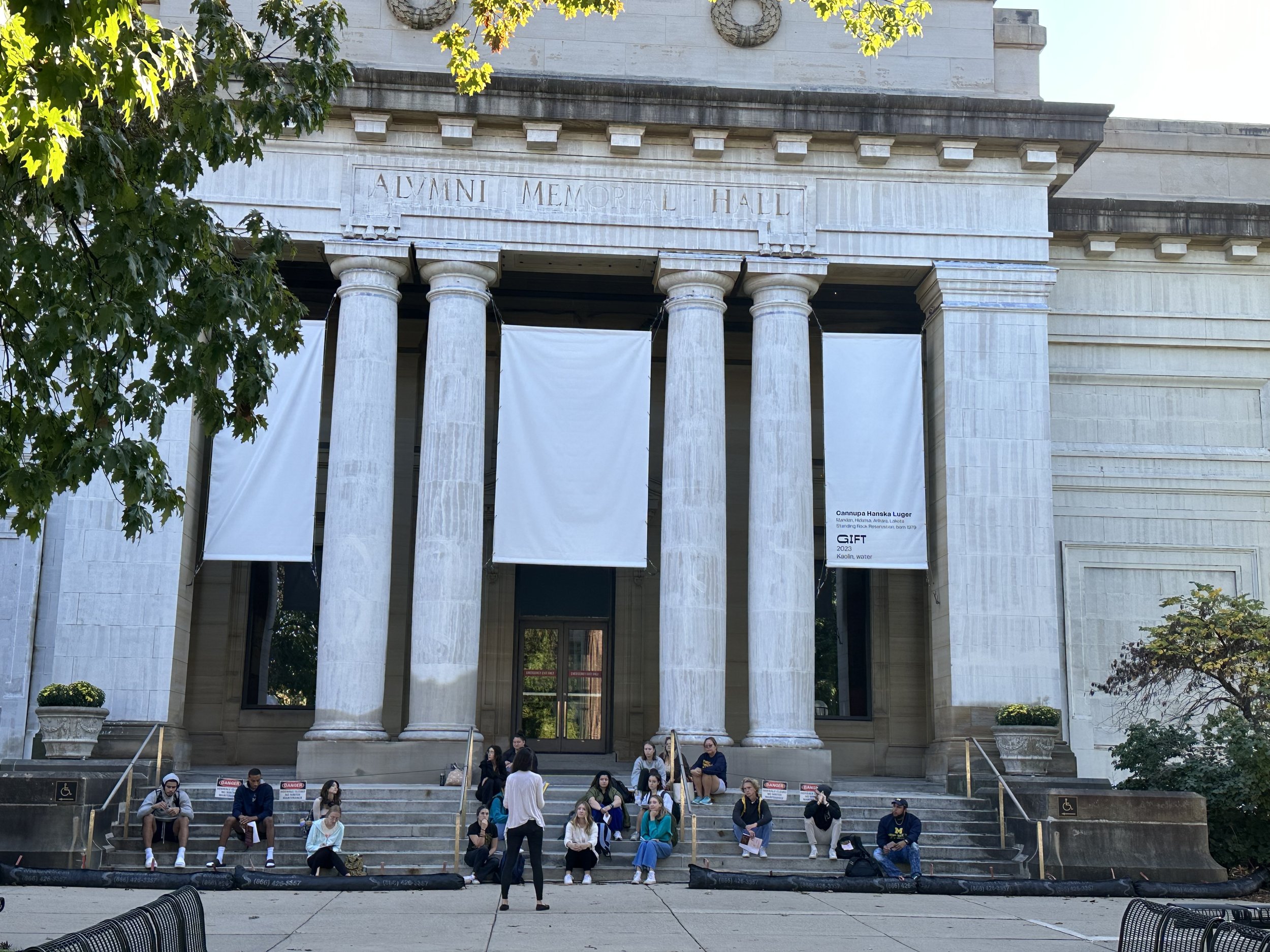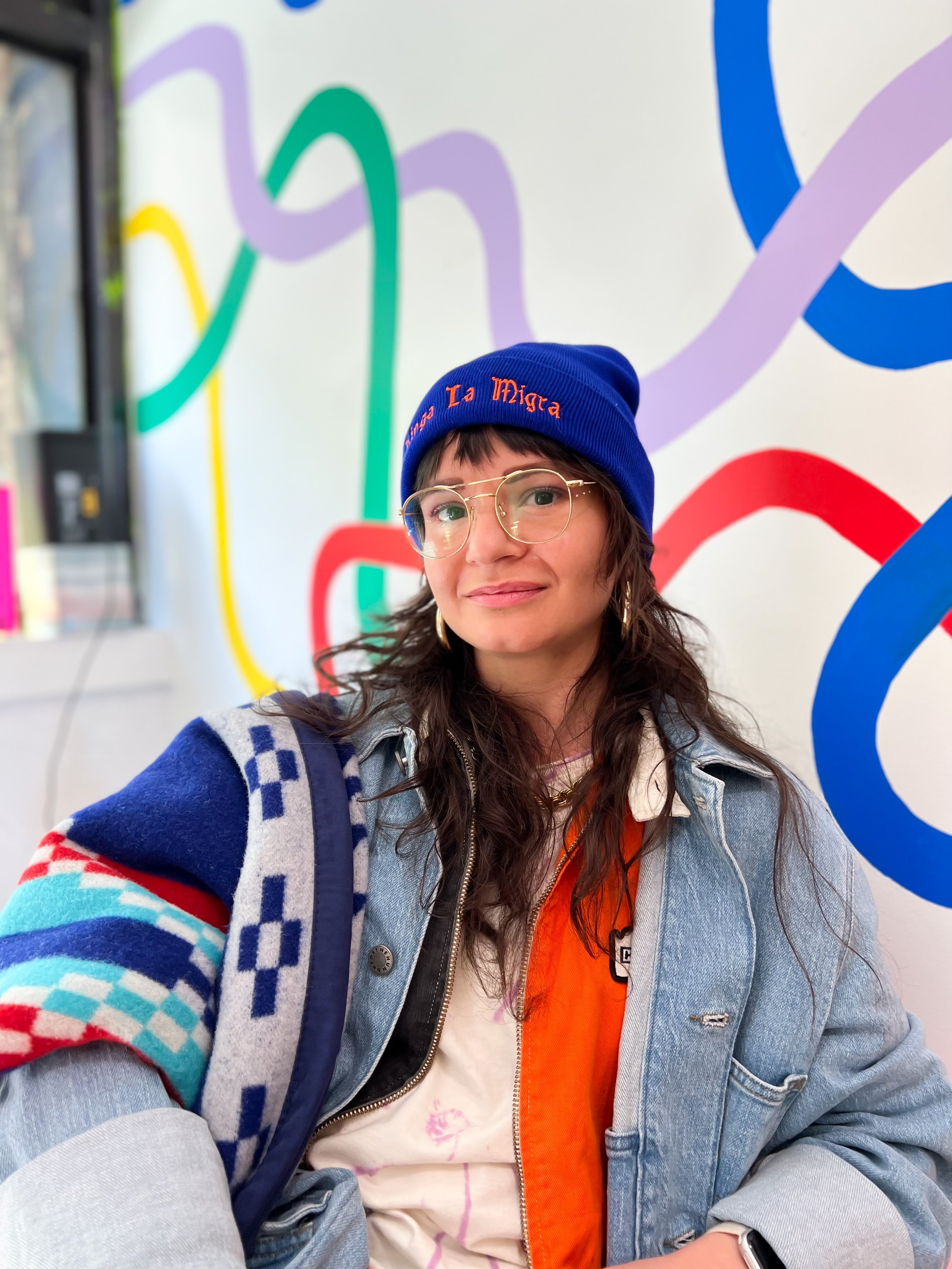You're Welcome: Conversation with Paul Farber, Cannupa Hanska Luger, and Ozi Uduma
For this episode of Broken Boxes I am joined by Monument Lab Director Paul Farber, University of Michigan Museum of Art Assistant Curator of Global Contemporary Art Ozi Uduma and artist Cannupa Hanska Luger. We gathered together in Ann Arbor Michigan in late September 2023 at the University of Michigan’s Media Center during the opening week of the monumental project and accompanying exhibition by Luger titled, You’re Welcome was developed over the course of two years between Cannupa, Monument Lab and the University of Michigan Museum of Art. This podcast conversation was a chance for the three creatives to speak vulnerably to the process of taking on such a large endeavor and how much care and energy goes into the creation of a project of this magnitude. We learn about the three primary components to the presentation including GIFT, an experimental, time-based, commissioned work by Luger on the front facade of UMMA’s Alumni Memorial Hall which challenges institutional memory and the whitewashing of history. GIFT is accompanied by two indoor installations: Meat for the Beast in the museums Irving Stenn, Jr. Family Gallery, which delves into Luger’s artistic practice and the relationship between museum collections and resource extraction; and Monument Lab: Public Classroom in the Art Gym, which examines formal and informal modes of memory. Moving through the conceptual application of this work, Paul, Ozi and Cannupa break down the larger themes of whiteness, language and time, and unpack the anchoring question of the project, How do we Remember?. The three offer their personal and professional reflections on implementing a project of this magnitude and it’s unknown long term impact. And in speaking to GIFT and the larger constellation of exhibiting works, Paul reflects, “This is an art project that doesn’t quite have a precedent. And that’s the point. It has cousins and kin and points of inspiration and citation, but this work is actually seeking to do something that has never been done in this way.” Over all, You’re Welcome explores the relationship between the Museum’s historic building, the land it stands on, and a long history of colonial narratives deeply embedded in public structures. It supports critical dialogues about the responsibilities of public institutions as cultural history makers and stewards, and it is a key component of UMMA’s ongoing efforts to challenge its history and practices to create an institution more reflective of its community and honest in its explorations of art, culture, and society.
HOW DO WE REMEMBER?
How do we remember on this campus? This is the central question asked in You’re Welcome, a dynamic three-part exhibition. The result of a multiyear collaboration with artist Cannupa Hanska Luger and nonprofit public art and history studio Monument Lab, You’re Welcome examines the foundational narratives of the land occupied by the University of Michigan and both national and global discourse on nationalism, land sovereignty, militarism, colonialism, and sites of memory.
GIFT
The centerpiece of the You’re Welcome exhibition, Cannupa Hanska Luger’s GIFT, is an experimental, time-based, commissioned work, responding to and challenging the University of Michigan’s origin story and the stewardship of the land it occupies.
In September 2023, Luger, a multidisciplinary artist and enrolled member of the Three Affiliated Tribes of Fort Berthold (Mandan, Hidatsa, Arikara and Lakota), painted the word “GIFT” in white porcelain clay slip on the columns of Alumni Memorial Hall, a neoclassical war memorial erected in 1910 that now houses UMMA. His point of departure is the 1817 Treaty of Fort Meigs, in which Ottawa, Chippewa, and Potawatomi tribes “gifted” land to the University that was then sold to found its endowments.
MEAT FOR THE BEAST
Meat for the Beast comprises two works by the multidisciplinary artist Cannupa Hanska Luger: This is Not a Snake and The One Who Checks and The One Who Balances. An enrolled member of the Three Affiliated Tribes of Fort Berthold (Mandan, Hidatsa, Arikara and Lakota), Luger was born and raised on the Standing Rock Indian Reservation. This is Not a Snake was created there, in the aftermath of the 2016 Dakota Access Pipeline protests. The “snake” is a serpentine monster made of riot gear, ceramics, fiber, steel, oil drums, concertina wire, ammunition cans, trash, beadwork, and other found objects. Interspersed within the creature’s body are artworks from UMMA’s collection selected by Luger and the exhibition’s curators to reflect on the historical and contemporary destruction and extraction of land as an expendable resource.
By positioning the “snake” as if it’s ingesting objects from the museum’s collection, Luger compares the damage done by extractive industries on Indigenous lands to that of museums, which have historically extracted objects and culture from Indigenous communities.
MONUMENT LAB: PUBLIC CLASSROOM
How do we remember on this campus? In addressing this central question of the exhibition You’re Welcome, Monument Lab, a nonprofit public art and history studio, worked with lead artist Cannupa Hanska Luger, University of Michigan Museum of Art staff, and University students, staff, and faculty to gather hundreds of responses. Using 121 of these compiled responses as a starting point, this “classroom” acts as an exploration of memory itself—how we remember, the physical and ephemeral forms memories take, and how they come to constitute the campus itself. This classroom includes a broad range of ways we remember—instances of personal, collective, ancestral, speculative, and institutional approaches to memory.
Featured song: A Tribe Called Red Ft. Hellnback - The Peoples\' Champ













